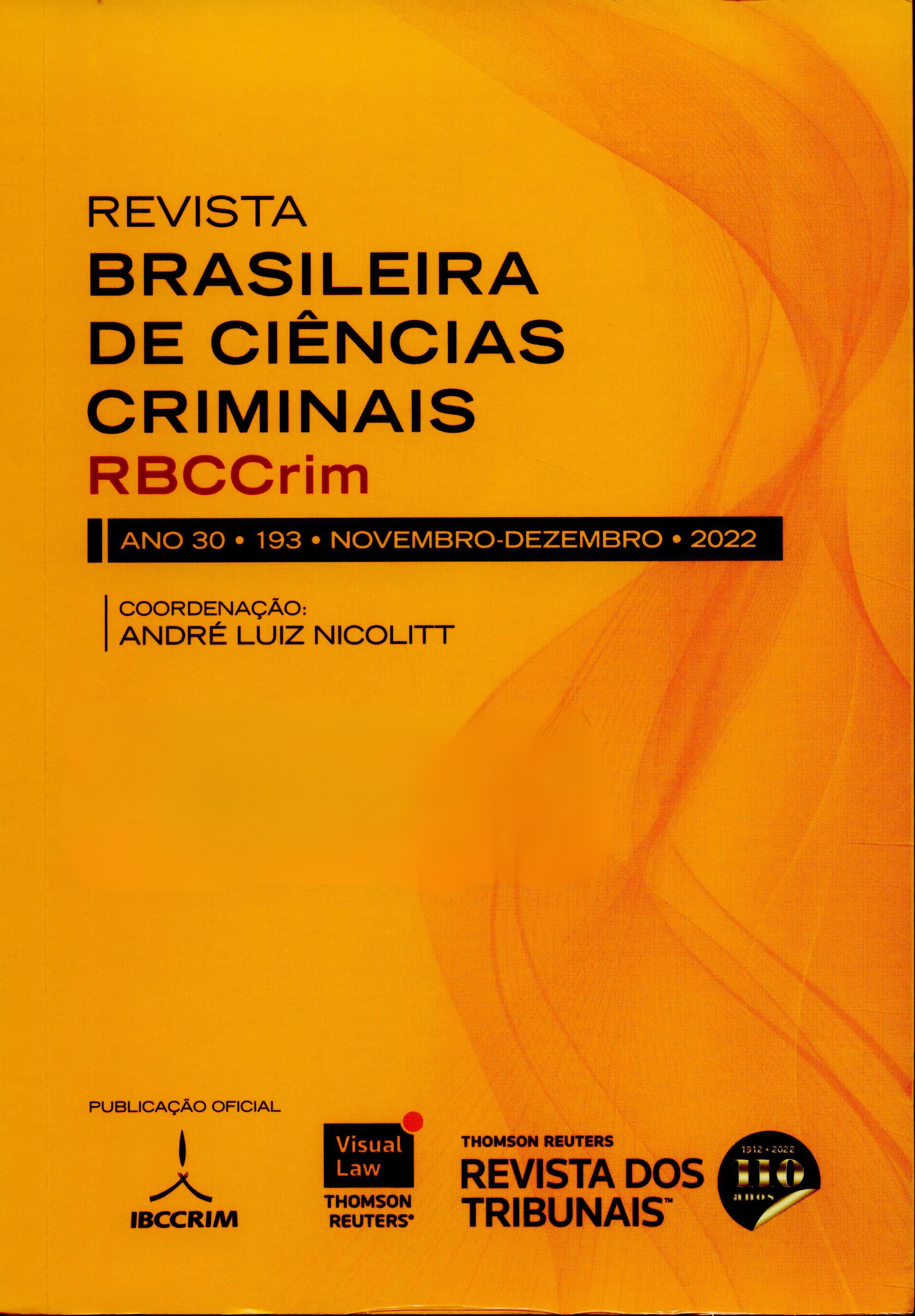Forensic interviewing of children in Brazil:
judges’ perceptions after five years of law reform
Visualizações: 45DOI:
https://doi.org/10.5281/zenodo.12628288Palavras-chave:
Entrevista forense, Treinamento, Reforma legislativa brasileira, Crianças, JuízesResumo
Brazil underwent legislative reform five years ago when law 13.431 came into force. This legislation requires a trained professional to interview children (in a safe environment) who are possible victims or witnesses of violence. This paper aims i) to identify judges’ views on the new requirements of the legislation and its implementation and ii) to make recommendations to further enhance the quality of forensic interviewing with children in Brazil. In doing so, this article sought the perspectives of judges, the final decision-makers, who have rarely been the focus of research. Sixteen face-to-face semi-structured interviews were conducted with State Judges across Brazil. Overall, three main concerns of judges were identified: (1) a lack of trained forensic interviewers; (2) a limited infrastructure of Courts to apply the procedure stated in the legislation; and (3) a minimal interest of legal practitioners in practices relating to forensic interviewing. The findings point to where public investments should be made.
Downloads
Publication Facts
Reviewer profiles Indisp.
Author statements
Indexed in
- Academic society
- Instituto Brasileiro de Ciências Criminais
- Publisher
- Editora Revista dos Tribunais (RT)
Referências
AKEHURST, L., MILNE, R. & KOHNKEN, G. (2003). The effects of children's age and delay on recall in a cognitive structured interview. Psychology, Crime & Law. 9, pp. 97-107. https://doi.org/10.1080=1068316021000057686
ANDREWS, S. J., AHERN, E. C., STOLZENBERG, S. N., & LYON, T. D. (2016). The productivity of wh- prompts when children testify. Applied Cognitive Psychology, 30, pp. 341-349. https://doi.org/10.1002/acp.3204
ANDREWS, S. K. & LAMB, M. E. The structural linguistic complexity of lawyers’ questions and children’s responses in Scottish criminal courts. (2017). Child abuse & Neglect, 65, 185-193. http://dx.doi.org/10.1016/j.chiabu.2017.01.022
ATC (2011) Raising the Bar. London: ATC.
AVILA, G. N. (2013). Falsas memórias e sistema penal: a prova testemunhal em xeque [False memories and the criminal system: testimonial evidence in check]. Lumen juris.
BARROS, F. DE M. (2008). A participação da vítima no processo penal [Victims participation on criminal lawsuits]. Lumen juris.
BAKER, M., FESSINGER, M., MCWILLIAMS, K., & WILLIAMS, S. (2021). The use of note-taking during forensic interviews: Perceptions and practical recommendations for interviewers. Developmental Child Welfare, 3(1), pp. 20-35. https://doi.org/10.1177/25161032211002187
BABB, B. A. (2021). Family law and therapeutic jurisprudence: A caring combination. Family Court Review, 59(3), pp. 409-413. https://doi.org/10.1111/fcre.12585
BAUGERUD, G., JOHNSON, M. S., HANSEN, H. B. G., MAGNUSSEN, S., & LAMB, M. E. (2020). Forensic interviews with preschool children: An analysis of extended interviews in Norway (2015-2017). Applied Cognitive Psychology, 34, pp. 654-663.
BITTAR, W. B. (2017). O problema do conteúdo da valoração do depoimento dos delatores diante do conceito de justa causa para o regular exercício da ação penal [The problem of the content of the recognition of the testimony of the informers towards the concept of just cause for the regular exercise of the criminal action]. Revista Brasileira de Direito Processual Penal, 3(1), 2525-510X. https://doi.org/10.22197/rbdpp.v3i1.41
BORGES, C., MAYER, S., & MARTINS, C. (22 Jun 2022). Quem ‘e Joana Ribeiro, ju’iza que impediu o aborto de uma menina de 11 anos que foi estuprada. [Who is Joana Ribeiro, the Judge who banned abortion for 11 year old girl who was raped]. G1 Santa Catarina. https://g1.globo.com/sc/santa-catarina/noticia/2022/06/22/quem-e-joana-ribeiro-zimmer-juiza-que-impediu-o-aborto-de-uma-menina-de-11-anos-que-foi-estuprada.ghtml
BRAUN, V., & CLARKE, V. (2006). Using thematic analysis in psychology. Qualitative Research in Psychology. https://doi.org/10.1191/1478088706qp063oa
BROWN, D. A., & LAMB, M. E.(2019). Forks in the road, routes chosen, and journeys that beckon: A selective review of scholarship on children’s testimony. Appl Cogn Psychol, 33, pp. 480-480. https://doi.org/10.1002/acp.3511
BRYMAN, A; CLARK, T; SLOAN, L; FOSTER, L. (2021). Bryman’s Social Research Method. Sith Edition. Oxford Press.
BRAZIL. Brazilian penal code. 1940. https://www.planalto.gov.br/ccivil_03/decreto-lei/del2848compilado.htm
BRAZIL. Statute of the child and adolescent. Law 8.069. 1990. https://www.planalto.gov.br/ccivil_03/leis/l8069.htm
BRAZIL. Law 13.431. 2017. http://www.planalto.gov.br/ccivil_03/_ato2015-2018/2017/lei/l13431.htm
BRAZIL. Ministério Público Federal. Recomendação nº 19/2022– GABDCE – PR/SC – MPF. Submitted by Daniele Cardoso Escobar. 22 Jun 2022. https://www.mpf.mp.br/sc/sala-de-imprensa/docs/2022/recomendacao-menor-hu-aborto
BRAZIL. Santa Catarina. Secretaria de Estado da Saúde. https://www.saude.sc.gov.br/index.php/informacoes-gerais-documentos/atencao-basica/nucleos/nucleo-de-atencao-a-saude-da-mulher-crianca-e-adolescente/manuais-e-publicacoes-saude-da-mulher/18514-interrupcao-legal-da-gestacao/file
BRUER, K. C., WILLIAMS, S., EVANS, A. (2022). Lawyer’s experience questioning children in Canadian court. Child Abuse & Neglect 134 (2022) 105930. https://doi.org/10.1016/j.chiabu.2022.105930
BULL, R., & MILNE, R. (2020). Recommendations for collecting event memory evidence. In J. POZZULO, E. PICA, & C. SHEAHAN (Eds.). Memory and sexual misconduct: Psychological research for criminal justice. Routledge.
CAMPOS, D. S. (2014). Análise da atuação do conselho tutelar diante das notificações de abuso e exploração sexual [Analysis of the action of the tutelary council facing notifications of sexual abuse and exploitation] [Masters dissertation, Fundação Oswaldo Cruz]. https://www.arca.fiocruz.br/bitstream/handle/icict/10962/daniel_campos_iff_mest_2014.pdf?sequence=2&isAllowed=y
CEZAR, J. A. (2010). A escuta de crianças e adolescente em juízo: uma questão legal ou um exercício de direitos? [Hearing of children in Court: a legal matter or a right being exercised?] In L. Potter (Ed.). Depoimento sem dano [Deposition without harm]. Lumen juris.
COOPER, P., DANDO, C., ORMEROD, T., MATTISON, M., MARCHANT, R., MILNE, R. & BULL, R. (2018). One step forward and two steps back? The ‘20 Principles’ for questioning vulnerable witnesses and the lack of an evidence-based approach. The International Journal of evidence & proof. 22(4), pp. 392-410.
CYR, M., DION, J., GENDRON, A., POWELL, M., & BRUBACHER, S. (2021). A test of three refresher modalities on child forensic interviewers’ posttraining performance. Psychology, Public Policy, and Law, 27(2), pp. 221-230. https://doi.org/10.1037/law0000300
DANDO, C. J., ORMEROD, T. C., COOPER, P., MARCHANT, R., MATTISON, M., MILNE, R, & BULL, R. (2018). No evidence against sketch reinstatement of context, verbal labels or use of registered intermediaries for children with autism spectrum disorder: Response to Henry et al. (2017). Journal of Autism and Developmental Disorders, 48, pp. 2593-2596. https://doi.org/10.1007/s10803-018-3479-z
DANDO, C. J., GABBERT, F., & HOPE, L. (2020). Supporting older eyewitnesses’ episodic memory: the self-administered interview and sketch reinstatement of context. Memory, 28(6), pp. 712-723. https://doi.org/10.1080/09658211.2020.1757718
DURSTON, G. (2011). Evidence: Text & Materials. 2nd edition. Oxford Press.
EARHART, B.; BRUBACHER, S. P.; POWELL, M. B.; WESTERA, N. J.; GOODMAN-DELAHUNTY, J. (2017). Judges’ delivery of ground rules to child witnesses in Australian courts. Child Abuse and Neglect. DOI: 10.1016/j.chiabu.2017.08.005
G. A. Res. 40/34 (Nov. 29, 1985). https://www.ohchr.org/en/instruments-mechanisms/instruments/declaration-basic-principles-justice-victims-crime-and-abuse
G. A. Res. 45/121 (Apr. 3, 1991). https://digitallibrary.un.org/record/105578?ln=en.
GRICE, H. P. (1989). Studies in the way of words. Harvard University Press.
GUIMARÃES, P., DE LARA, B, & DIAS, T. (2022, June 20). Suportaria ficar mais um pouquinho? [Would stand to keep it a little longer?]. The Intercept Brasil. https://theintercept.com/2022/06/20/video-juiza-sc-menina-11-anos-estupro-aborto/
HABIGZANG, L. F., RAMOS, M. S., KOLLER, S. H. (2011). A revelacao de abuso sexual: as medidas adotadas pela rede de apoio. [The disclosure of sexual abuse: adopted measures bu the support network]. Psicologia: Teoria e Pesquisa. 27(4), pp. 467-473.
HAGSANDA, A. V., HJELMSÄTERA, E. R., GRANHAGA P. A., FAHLKEA, C., & GORDH, A. S. (2017). Witnesses stumbling down memory lane: The effects of alcohol intoxication, retention interval, and repeated interviewing. Memory, 25(4), pp. 531-543. http://dx.doi.org/10.1080/09658211.2016.1191652).
HERSHKOWITZ, I., AHERN, E. C., LAMB, M. E., BLASBLAG, U., KARNI-VISEL, Y., & BREITMAN, M. (2017). Changes in interviewers’ use of supportive techniques during revised protocol training. Applied Cognitive Psychology, 31, pp. 340-350. DOI: 10.1002/acp.3333
HILL, J. A., & MOSTON, S. (2011). Police perceptions of investigative interviewing: training needs and operational practices in Australia. The British Journal of Forensic Practice, 13(2), pp. 72-83. https://doi.org/10.1108/14636641111134314
HOWE, M. L. & KNOTT, L. M. (2015). The fallibility of memory in judicial processes: Lessons from the past and their modern consequences. Memory, 23(5), pp. 633-656. http://dx.doi.org/10.1080/09658211.2015.1010709)
LAMB, M. E., & BROWN, D. A. (2006). Conversational apprentices: Helping children become competent informants about their own experiences. British Journal of Developmental Psychology, 24, 215–234. DOI:10.1348/026151005X57657
LAMB, M. E., HERSHKOWITZ, I., ORBACH, Y. & ESPLIN, P. W. (2008). Tell me what happened: structured investigative interviews of child victims and witnesses. John Wiley & Sons.
LIMA, R. B. (2013). Curso de Processo Penal. Impetus.
LOFTUS, E. F.; WOLCHOVER, D.; & PAGE, D. (2006). General Review of the Psychology of witness testimony In A. Heaton-Armstrong; E. Shepherd; G. Gudjonsson; & D. Wolchover (Ed). Witness Testimony: Psychological, investigative and evidential perspectives, Oxford Press, p. 7-22.
LOFTUS, E. (2013). The fiction of memory. Youtube. https://www.youtube.com/watch?v=HbMO1__9K5g
MATTISON, M. L. A., DANDO, C. J., & ORMEROD, T. C. (2015). Sketching to remember: episodic free recall task support for child witnesses and victims with autism spectrum disorder. J Autism Dev Disord, 45, pp. 1751-1765. DOI 10.1007/s10803-014-2335-z
MILNE, B. & BULL, R. (2006). Interviewing victims of crime, including children and people with intellectual disabilities. Kebbell, M. & Davies, G. (Ed.). Practical Psychology for forensic investigations and prosecutions. Wiley.
MILNE, R. & BULL, R. (2010). Does the cognitive interview help children to resist the effects of suggestive questioning? Legal and Criminological Psychology. 8(1), 21-38. https://doi.org/10.1348/135532503762871219
MILNE, R., SHARMANB, S. J., POWELL, M. B., & MEAD, S. (2013). Assessing the Effectiveness of the Cognitive Interview for Children with Severe Intellectual Disabilities. International Journal of Disability, Development and Education, 60(1). 18–29, http://dx.doi.org/10.1080/1034912X.2013.757137
MITCHELS, B. (2016). Children and vulnerable witnesses in court proceedings. Wildy, Simmonds & Hill Publishing.
NIELD, R.; MILNE, R.; BULL, R.; & MARLOW, K. (2003). The Youth Justice and criminal evidence Act 1999 and the interviewing of vulnerable groups: A practitioner’s perspective. Legal and criminlogical Psychology, 8, 223-228. https://doi.org/10.1348/135532503322362997
O’MAHONY, B. M. (2016). How Effective are Judges and Counsel at Facilitating Communication with Vulnerable Persons in a Criminal Trial? In Cooper, P.; & Hunting, L. (Ed). Addressing vulnerability in Justice systems. Wildy, Simmonds & Hill Publishing.
PASE, H. L., CUNHA, G. P., BORGES, M. L.; & PATELLA, A. P. D. (2020). O Conselho Tutelar e as políticas públicas para crianças e adolescentes. [The Guardianship Council and public policy for children and adolescents]. Cad. EBAPE.BR, 18(4), 1003-1010. https://doi.org/10.1590/1679-395120190153
PAGE, M. & PRECEY, G. (2002). Child protection concerns when questioning children. In H. I. Westcott; G. M. Davies & R. Bull (Ed.), Children's testimony: a handbook of psychological research and forensic practice (pp. 37-50). John Wily & Sons Ltd.
PERRY, N. W., MCAULIFF, B. D., TAM, P., CLAYCOMB, L., DOSTAL, C. & FLANAGAN, C. (2001). When lawyers question children: is justice served? In R. Bull (Ed.), Children and the law: the essential readings. (pp. 304-332). Blackwell Publishers.
POWELL, M. B., & BARNETT, M. (2015). Elements underpinning successful implementation of a national best-practice child investigative interviewing framework. Psychiatry, Psychology and Law, 22(3), pp. 368-377. http://dx.doi.org/10.1080/13218719.2014.951112
POYSER, S. & MILNE, R. (2015). No grounds for complacency and plenty for continued vigilance: miscarriages of justice as drivers for research on reforming the investigative interviewing process. Police Journal, 88(4), pp. 265-280. https://doi.org/ 10.1177/0032258X15598951
POYSER, S.; & MILNE, R. (2021). The time in between a case of ‘wrongful’ and ‘rightful’ conviction in the UK: Miscarriages of justice and the contribution of psychology to reforming the police investigative process. International Journal of Police Science & Management, 23(1), pp. 5-16. https:doi.org/10.1177/14613557211006134
PLOTNIKOFF, J. & WOOLFSON, R. (2002). What do judges know about young witnesses? In H. I. Westcott; G. M. Davies & R. Bull (Ed.), Children's testimony: a handbook of psychological research and forensic practice (pp. 295-308). John Wily & Sons Ltd.
QUAS, J. A. & SUMAROKA, M. (2011). Consequences of legal involvement on child victims of maltreatment. P. 323-350. Lamb, M. E.; La Rooy, D. J.; Malloy, L. C.; & Katz, C. (Ed.). Children’s testimony: a handbook of psychological research and forensic practice. Wiley-Blackwell.
ROBERTS, P. & ZUCKERMAN, A. (2010). Criminal Evidence. Second Edition. Oxford University.
SANDERSON, J. & WEATHERS, M. R. (2019). “Every time someone comes forward it makes it easier for the next survivor to be heard”: Sport as a triggering agent to break the silence of child sexual abuse. Communication Quarterly, 67(3), pp. 333-353. https://doi.org/10.1080/01463373.2019.1596141
SANTOS, S. & DELL’AGLIO, D. (2010). Quando o silêncio é rompido: o processo de revelação e notificação de abuso sexual infantil [When silence is broken: the process of reveal and report of child sexual abuse]. Psicologia & Sociedade, 22 (2), 328-335. https://doi.org/10.1590/S0102-71822010000200013
SAYWITZ, K. J. & NATHANSON, R. (1993). Children’s memory and their perceptions of stress in and out of the courtroom. Child abuse & neglect, 17, 613-622.
SAYWITZ, K. J. (1995). Improving children’s testimony: the question, the answer, and the environment. In Zaragoza, M. S., Graham, J. R., Hall, G. C. N., Hirschman, R.; Ben-Porath, Y. S. (Ed), Memory and testimony in the child witness (pp. 113-140). SAGE Publications.
SAYWITZ, K. J., & CAMPARO, L. B. (2013). Evidence-based Child Forensic Interviewing: The Developmental Narrative Elaboration Interview. Oxford University Press.
SAYWITZ, K. J. & CAMPARO, L. B. (2014). Interviewing Children: A primer (371-391). Melton, G. B., Ben-Arieh, A., Cashmore, J., Goodman, G. S., & Worley, N. K. The SAGE Handbook of Child Research. SAGE.
SCHMIDT, S.; KRIMBERG, J. S.; STEIN, L. M. (2020). Conhecimento dos magistrados sobre processos de memória nos relatos testemunhais e no reconhecimento de pessoas. [Magistrates' knowledge of memory processes in witness testimony and people recognition]. Revista dos Tribunais Online, 173, pp. 201-243.
SPENCER, J. R. & LAMB, M. E. (2012). Children and Cross-Examination: Time to change the rules? Hart Publishing.
STEELE, L. C. (2012). The forensic interview: A challenging conversation. Goodyear-Brown, P. (Ed.). Handbook of child sexual abuse: Identification, assessment, and treatment (pp. 99–119). John Wiley & Sons, Inc.
STEIN, L. M., PERGHER, G. K. & FEIX, L. F. (2009). Desafios da oitiva de crianças e adolescentes: Técnicas de entrevista investigativa. [Challenges on hearing children and adolescents: investigative interview techniques]. Childhood Brasil.
STEWART, H., KATZ, C. & LA ROOY, D. J. (2011). Training forensic interviewers. In M. E. Lamb, D. J. La Rooy, L. C. Malloy; & C. Katz (Ed.), Children's testimony: a handbook of psychological research and forensic practice. 2nd edition. (pp. 199-216). John Wily & Sons Ltd.
VERKAMPT, F., DODIER, O., MILNE, R., & GINET, M. (2021). An analysis of the quality of investigative interviews with children in France: age of the witness does matter. Police Practice and Research, 22:2, 1130-1154. https://doi.org/10.1080/15614263.2019.1658581
Walker, N. E. (2002). Forensic interviews of children: the components of scientific validity and legal admissibility. Law and contemporary problems. 65(1), 149-178. Available at: https://scholarship.law.duke.edu/lcp/vol65/iss1/6
WATERHOUSE, G. G., RIDLEY, A. M., BULL, R., & WILCOCK, R. (2020). A study analysis for multiple interviewing of child witnesses. Child Abuse Review, 29, pp. 544-558. https://doi.org/10.1002/car.2604
WESTERA, N. J., POWELL, M. B., MILNE, R., & GOODMAN-DELAHUNTY, J. (2016). Police interviewing of sexual assault victims: Current organisational responses and recommendations for improvement. In R. Bull and I. Blandon-Gitlin. (Eds.), Handbook of legal and investigative psychology. Routledge.
WINICK, B. J., & WEXLER, D. B. (2003). Judging in a therapeutic key. Carolina Academic.
Wright, R. & Powell, M. B. (2006). Investigative interviewers’ perceptions of their difficulty in adhering to open-ended questions with child witnesses. International Journal of Police Science & Management. 8(4), 316-325. https://doi.org/10.1350/ijps.2006.8.4.316
ZAVATTARO, M. S. (2018). Depoimento Especial: aspectos jurídicos e psicológicos de acordo com a lei 13431/2017 [Special Testimony: juridical and psychological aspects according to Law 13.431/2017]. D’Placido.
Publicado
Como Citar
Edição
Seção
Licença
Os direitos autorais dos artigos publicados são do autor, com direitos do periódico sobre a primeira publicação.
Os autores somente poderão utilizar os mesmos resultados em outras publicações indicando claramente este periódico como o meio da publicação original. Se não houver tal indicação, considerar-se-á situação de autoplágio.
Portanto, a reprodução, total ou parcial, dos artigos aqui publicados fica sujeita à expressa menção da procedência de sua publicação neste periódico, citando-se o volume e o número dessa publicação. Para efeitos legais, deve ser consignada a fonte de publicação original.



 Português (Brasil)
Português (Brasil)
 English
English
 Español (España)
Español (España)












 Assine a Revista:
Assine a Revista: 

